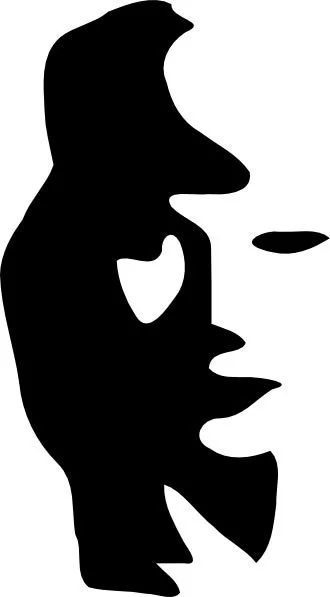by Tim Holler
I recently had the opportunity to speak at a men’s retreat for a local church. The Pastor who invited me to speak requested this topic, “The Heart of the Father”, and pretty much left it at that. But little else was needed in terms of explanation.
There’s something in that phrase that explains itself.
There is a feeling and a longing that wells up in our souls when we hear it.
“The Heart of the Father.” Our hearts reach out for something that we either had as children and want more of, or missed out on and deeply long for, but never really put words to. “The Heart of the Father”.
But for many of us, that deep longing is so deep that we can’t get there. There is a barrier we can’t see past. We can illustrate that barrier with this image:
This is a classic dual image representing perspective. What do you see? Do you see a man playing a saxophone? Do you see a woman’s face? Neither is wrong. Both are present in the image. (And don’t read anything into your psyche if you see one or the other. This is not a Rorschach test!) But it does demonstrate the impact of each person’s individual experience and “lenses” through which they experience the world, and that includes their experience of who the Father is and what the Father is like.
We all long for, from the moment we are born, the loving gaze of another.
We unabashedly stare into the eyes of others, looking for and expecting delight, acceptance, affirmation, and belonging.
Of course, we have no idea how to verbalize these longings or how to attain these relational nutrients. We don’t even have anything to give in exchange for them. But we need them nonetheless. We need the loving gaze of another. Clearly, in most circumstances, that will be parents: dad and mom. Those who were, by design, representatives of the Father. But since the dawn of time, every set of parents has failed to some degree or another, and some significantly, to give that loving gaze.
I have heard so many stories about men and women who can only think of the Father as a hard taskmaster, a rigid ruler whose expectations are unattainable. Their fathers were distant, difficult to please, demanding, and cold. They grew up with parents who were controlling and harsh. Or maybe one parent was controlling, and the other was more nurturing, and now the Father’s character is confusing.
As the above image on perspective demonstrates, each of us sees the Father and fathering in different ways.
It even has an impact on how we end up parenting our own children. Even though men often try to not be the father their father was, they usually just become a better version of who he was.
How do we overcome this barrier? It was a painful, disruptive, unhealthy experience that created this view of who the Father is. It will only be a warm, healthy, caring, accepting experience with the Father and others that will heal the wounds, then open up space to long for Him more, for Him to step in and be with you.
“The desire to please God, pleases God.”
For many of us, uncovering these wounds from our childhood needs to be treated carefully in the presence of a professional counselor or therapist. The work is too painful and sensitive to be taken lightly or handled alone. Others can utilize the resources of friends, family, and pastors. There are very good resources available, such as these books by David Benner: Surrender to Love, The Gift of Being Yourself, and Desiring God’s Will.
But whatever you do, I encourage you to do something. As they say, “If nothing ever changes, nothing ever changes.” Reach out for help.


